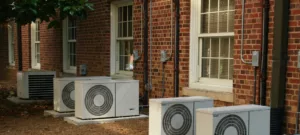It’s true: you may already know a thing or two about what you’re going to learn. There is nothing wrong with a little “refresher course” when it comes to knowledge, and properly balancing the system so your entire home is set at the same temperature. There is always room for maximum optimisation and improvement, as air conditioning is a never-ending, upgradeable necessity of our everyday lives. If you’re not keen on repairing (and re-installing) ducts and registers for your HVAC, here are a few methods for preventing sky-high costs and headaches when maintaining and repairing your air conditioning system.
1. Grab The Hose
After a certain amount of time, all machinery and electric units gather dust. Once enough dust accumulates, the machine uses more power to “push” cold or hot air throughout your vents. In time, this accumulation clogs your unit – giving you no air at all and, in worse case scenarios, sending out for expensive replacement parts.
This headache can be prevented by spraying your outdoor unit, top down, from the hose. How often should you “shower” your conditioning unit depends entirely on your ability to notice the first signs of airflow slowing throughout your home.
2. Maintenance
It’s no surprise that the harder your system works (through years of built up grime, dust, etc.) the faster it speeds up its imminent “death”. That’s why tuning up your air conditioning unit on a yearly basis is a wise time investment.
Doing this saves on air conditioning repair costs, as well. No self-respecting vehicle owner would drive their vehicle year-round without inspecting the engine, motors, belts and everything else under the hood. HVAC units share the same concept – and demand as equal attention.
Another way to save on maintenance costs is to check the refrigerant of your central air system every 3-4 months. Without refrigerant, your conditioner doesn’t have enough power to fully heat or cool down your house.
3. Be Smart
Under no circumstances must your air conditioner be turned off during the summer. By turning it off, humidity and hot air will collect in your home. The more this happens, the more time it will take (and power) for your system to get rid of that heat and humidity. There is no use turning on an air conditioner when it is hot, as you know it will take several hours before you feel the full effect of that sweet, serenading cool breeze.
Instead, wait for earlier and colder parts of the day, and turn up your system’s thermostat by a few degrees. Opening your windows to let the natural coldness in will help cool your home down. Once it gets warm enough outside, the air from your HVAC system will initiate. This will be your cue to close the windows and let your air conditioning system work its magic the way it’s supposed to.
Conclusion
Lastly, do you know when your HVAC system was installed? Replacing out-of-date units with models that have been certified by Energy Star have proven to cool down (and heat up) more effectively, in a shorter time, with less yearly downtime. The energy efficiency certification program, founded in 1992, is fully backed by the government. There is a whole movement dedicated toward replacing most forms of electric equipment and machinery with energy-efficient models. Even so, if you follow these tips you will spend less time paying contractors and HVAC professionals in repair fees; ultimately giving you less migraines and headaches to enjoy the sweet paradise of home you’ve created for yourself.








